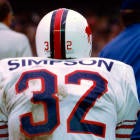
O.J. Simpson died on Wednesday at the age of 76 and although he leaves behind a complicated legacy, he will always be a Pro Football Hall of Famer.
The former Bills running back was inducted into the Pro Football Hall of Fame in 1985 and he was never removed from the Hall, despite facing some serious legal issues after his induction. The reason Simpson's bust is still in Canton, Ohio, is because the Hall of Fame won't remove any player under any circumstance.
"Once elected, nothing in the Pro Football Hall of Fame's bylaws allows for the removal of a Hall member," the HOF stated in 2020.
Simpson was voted into the Hall of Fame after putting together one of the most impressive rushing careers in NFL history. After being selected by the Bills with the No. 1 overall pick in the 1969 NFL Draft, Simpson went on to lead the league in rushing four times in 11 years while also being name NFL MVP once (1973).
His career actually got off to a slow start -- he averaged just 642.3 rushing yards per season during his first three years -- but he broke out in 1972 after Lou Saban took over Buffalo's head coach.
Simpson led the NFL in rushing with 1,251 yards during his first year with Saban and then he topped that in 1973 by becoming the first running back to crack the 2,000-yard mark. The most impressive part about Simpson's MVP season in 1973 is that he rushed for 2,003 yards at a time when the NFL's regular season was just 14 games long. His 143.1 yards per game still ranks as the highest rushing average in NFL history.
To put Simpson's performance in perspective, no other running back even rushed for 1,150 yards in 1973.
Hall of Fame President Jim Porter released a statement after Simpson's death was announced on Thursday.
"O.J. Simpson was the first player to reach a rushing mark many thought could not be attained in a 14-game season when he topped 2,000 yards," said Porter. "His on-field contributions will be preserved in the Hall's archives in Canton, Ohio."
Although Simpson never hit the 2,000-yard mark again, he did lead the NFL in rushing in 1975 with 1,817 yards and 1976, when he totaled 1,503 yards on the ground. He finished his career with 11,236 yards, which still ranks as the 21st highest number in NFL history.
In his 11-year career, Simpson went to six Pro Bowls and he got voted as a first-team All-Pro five times. He was also on the NFL's 100th anniversary all-time team.
When Simpson came up for Hall of Fame enshrinement in 1985, the choice was easy and he got in as a first-ballot Hall of Famer. However, things got much more complicated after that.
In 1994, Simpson was charged with double-murder in the deaths of his ex-wife Nicole Brown Simpson and her friend Ronald Goldman. Although Simpson was acquitted of the murders in October 1995, he was later found liable for the deaths in civil court. The former Bills running back was ordered to pay $33.5 million after a judge ruled against him in wrongful death lawsuits filed by the families of the victims.
Over the course of his lifetime, Simpson didn't end up paying a huge chunk of the judgement, but the Goldmans did get some money in 1999 when Simpson was forced to sell his Heisman Trophy, which he had won in 1968 while attending USC.
The trophy sold for $255,500 at auction in 1999 and those funds went to the Goldman family. Despite his legal troubles, the Heisman Trust never stripped Simpson of his trophy. Like the Hall of Fame, the Trust doesn't have any bylaws in place that would allow it to rescind the award, so although Simpson doesn't have the trophy anymore, he will hold the title of "Heisman winner" for the rest of time (Simpson's trophy is now owned by a Nevada businessman, who bought it in 2019).
The Heisman Trust even released a statement following Simpson's death.
"The Heisman Trophy Trust mourns the passing of 1968 Heisman Trophy winner, O.J. Simpson. We extend our sympathy to his family," the trust said.
Although Simpson lost the civil suit to the Goldmans, he never had to serve any jail time for the double murders. However, he did end up in jail just over a decade later. At 60 years old, Simpson spent nearly 10 years in prison after he was convicted of armed robbery and kidnapping in Las Vegas in 2008. He was eventually released from prison in October 2017.
Yes, Simpson accomplished a lot on the football field, but all of that was overshadowed by the decisions that he made later in life.

















